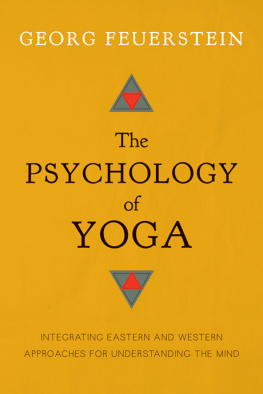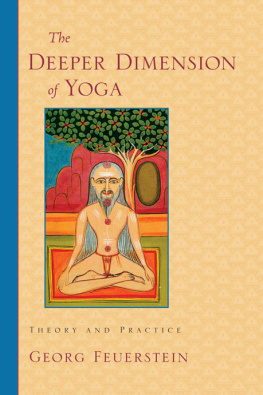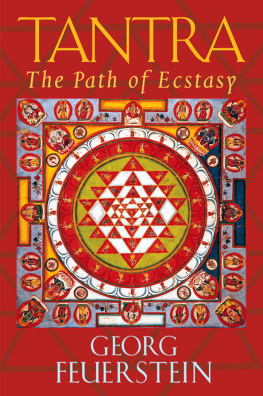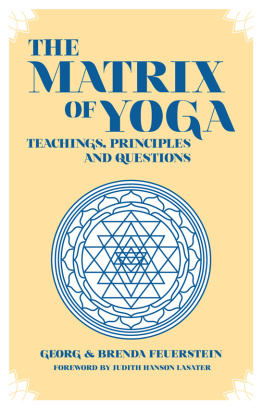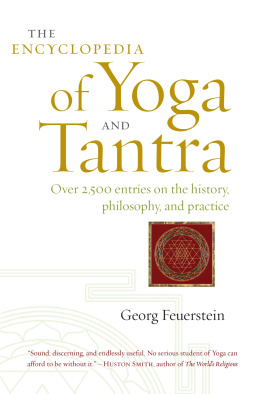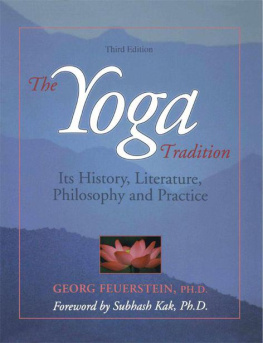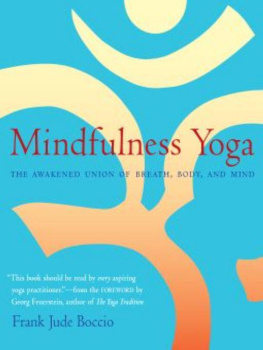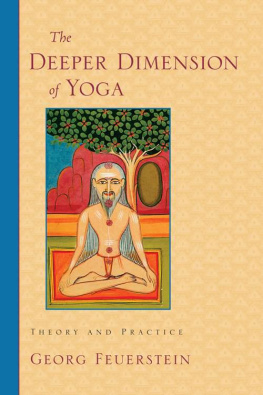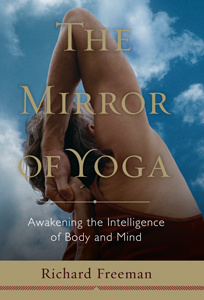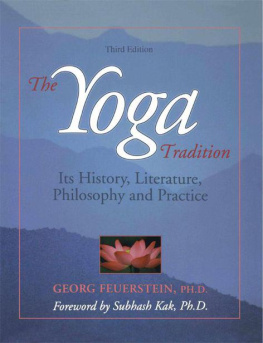As with all of his previous contributions to the literature of Yoga, Dr. Feuersteins Psychology of Yoga stands apart as a masterwork, exhaustively researched and intelligently written, a treasure of insight for the serious student into this most complex subject.
Richard Rosen, author of Original Yoga and The Practice of Pranayama
A feast of wisdom and lore assembled from a perspective possible only for one whose monumental scholarship has been tempered and leavened by practice. The Psychology of Yoga will be an invaluable and enduring resource for students of Yoga, Buddhism, and psychology.
Chip Hartranft, author of The Yoga-Stra of Patajali: A New Translation with Commentary
ABOUT THE BOOK
Psychoanalysis itself and the lines of thought to which it gives rise, said C. G. Jung, are only a beginners attempt compared to what is an immemorial art in the Eastby which he was referring to the millennia-old study of the mind found in Yoga. That tradition was hardly known in the West when the discipline of psychology arose in the nineteenth century, but with the passing of time the common ground between Yoga and psychology has become ever more apparent. Georg Feuerstein here uses a modern psychological perspective to explore the ways Hindu, Buddhist, and Jaina yogas have traditionally regarded the mind and how it worksand shows how that understanding can enhance modern psychology in both theory and practice.
GEORG FEUERSTEIN, PhD, (19472012) is internationally respected for his work on Yoga and is the author of over fifty books. He designed and taught several distance-learning courses on Yoga philosophy for Traditional Yoga Studies. For more information, go to www.traditionalyogastudies.com.
Sign up to receive news and special offers from Shambhala Publications.

Or visit us online to sign up at shambhala.com/eshambhala.
The Psychology of Yoga
Integrating Eastern and Western Approaches for Understanding the Mind
GEORG FEUERSTEIN

Shambhala
BOSTON & LONDON 2013
Shambhala Publications, Inc.
Horticultural Hall
300 Massachusetts Avenue
Boston, Massachusetts 02115
www.shambhala.com
2013 by Brenda Feuerstein
Cover design by Katrina Noble
All rights reserved. No part of this book may be reproduced in any form or by any means, electronic or mechanical, including photocopying, recording, or by any information storage and retrieval system, without permission in writing from the publisher.
Library of Congress Cataloging-in-Publication Data
Feuerstein, Georg.
The psychology of yoga: integrating Eastern and Western approaches for understanding the mind/Georg Feuerstein.First Edition.
Pages cm
Includes bibliographical references and index.
eISBN 978-0-8348-2921-3
ISBN 978-1-61180-042-5 (pbk.: alk. paper)
1. YogaPsychology. I. Title.
BL1238.54.F48 2014
181.45dc23
2013010150
In memoriam Lee (Liberatore) Sannella, visionary, author, and dear friend. And to Brenda, my beautiful wife and spiritual partner, for sharing with me the difficult path of inner growth and illumination with great love and compassion.
Contents
gnothi seauton
Know thyself.
ORACLE AT DELPHI
tmnam... viddhi
Know thyself.
Katha-Upanishad 1.3.3
The psychology of Yoga in its Hindu, Buddhist, and Jaina forms (see Appendix 1) is a much-neglected area of research but one that is potentially rewarding to write about and harvest for the benefit of both dedicated students of Yoga and specialists in psychology wishing to become acquainted with Yogas psychological concepts. Both the breadth of my subject and the depth to which I am exploring it are challenging, and I would probably not have dared to attempt this study if I had gauged its difficulty before embarking on it with my usual enthusiasm and boldness.
To state my position clearly up front, I understand psychology in a nonbehavioristic manner as the study of the mind in the broadest sense of the term. In other words, I am advocating a nonmaterialist viewpoint. It is impossible to bracket philosophy when considering psychology. In the West, the philosophical presuppositions of psychology are usually implied rather than stated for everyone to witness. The framework in question is, of course, a one-dimensional materialism, which a priori deems the mind to be an epiphenomenon of the brain and nervous system and therefore routinely dismisses all claims to the contrary.
That Ren Descartess dualistic model, which underlies the reigning scientific paradigm with its supposedly inviolable dogma of objectivism, is not universally applicable has become clear to all but the most inflexible adherents of the ideology of scientism. Yet even those who do not subscribe to the Cartesian paradigm have so far not unanimously agreed on a strong contender for a new one. Thus, there is a theoretical gray area, which is another way of talking about the crisis in present-day science. I believe that presenting the psychological teachings of the Eastern wisdom traditions as clearly and honestly as possible can prove helpful in this transitional phase in the unfolding of science. I am open to an explanation of the mind-matter relationship that does not follow the ruling paradigm of Cartesian dualism. I have not, however, found the existing alternativesmany of them influenced by or based on quantum-theoretical speculationsentirely convincing. But they all gesture toward a new paradigm that will fully emerge sooner or later.
The Wests interest in the psychology of Yoga dates back to the Roaring Twenties and to the fateful fascist thirties. From that time on, treatments of the psychological dimension of Yoga have been published sporadically in both Western countries and India, with a focus either on Indology (the study of Indian culture) or on psychology (see Appendix 2). Of more recent writings, I wish to single out Karl Baiers incisive 1998 exploration in German of the reception of Yoga in the field of depth psychology, which comprises chapter 8 of his fine monograph Yoga auf dem Weg nach Westen (Yoga on the Way to the West). I have also greatly profited from his colossal two-volume study on meditation (2009), also in German, which examines the historical pathways leading from the medieval Christian contemplative tradition to the sixteenth-century meditation system of Saint Ignatius of Loyola to seventeenth-century quietism to eighteenth-century mesmerism to nineteenth-century occultism, theosophy, and New Thought (also called Mind Cure and Mental Science), and from there to twentieth-century depth psychology, autogenic training, the New Age movement, Buddhism, and Yoga. Baiers splendid survey ends with the countercultural developments of the 1980s. Unfortunately, he only touches on Tibetan Buddhism, which succeeded the introduction of Buddhism and Yoga into the West and became singularly prominent on the North American continent in the 1970s.
Parallel to Baiers searching monograph but focusing on the English-speaking world is Elizabeth de Micheliss A History of Modern Yoga (2004). She traced the historical roots of modern Yoga to the Bengali renaissance movement and the publication of Swami Vivekanandas relatively free but popular translation of the Yoga-Stra in 1896 along neo-Hindu/Vedntic lines. Few know that his commentary was originally spoken, because he regarded writing a botheration (Vivekananda 1972, 293).
All the books mentioned here have offered valuable parameters for my own investigation into the psychology of Yoga. The present study is the most comprehensive foray to date into the subject matter. It is based on my many years of delving into the Hindu and Buddhist forms of Yogaboth theoretically and practicallyand, to a much lesser degree, Jaina Yoga from a historical, literary, and philosophical viewpoint. My laymans grasp of modern psychology, which I have acquired over a lifetime but mainly while preparing my book
Next page
